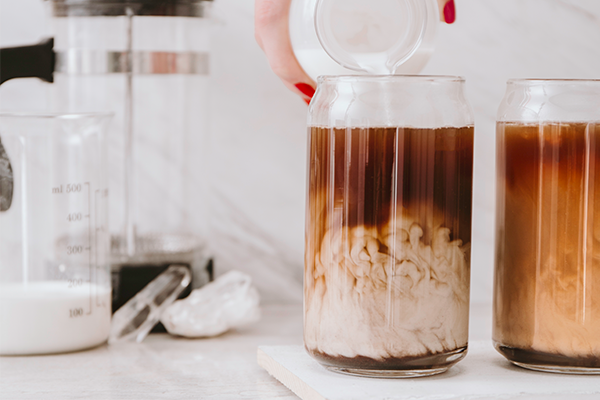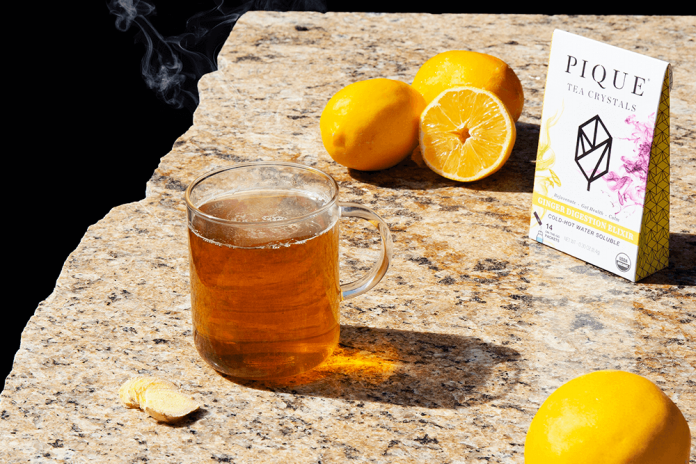Wait, don’t go! Yes, this is an unpopular topic with coffee drinkers, and we should know, we’ve been there. But give us a minute and we’ll help you to hopefully learn something new and maybe even inspire you.
Tea vs. Coffee
In this age-old debate, there seems to be a common belief that coffee is the indulgent treat that isn’t all that good for you, while tea is the “healthier” drink. But is there any truth to this? We were curious, so we decided to dig into the various benefits of both.
It’s helpful to look at how each drink stacks up within various categories:
1. Healthy aging
Coffee: Both tea and coffee naturally contain a substantial amount of plant antioxidants called polyphenols. Polyphenols help your body fight against free radicals to help support against the oxidative damage your body is subjected to every day.
The difference in health benefits between the polyphenols in coffee and tea is in how the two beverages are prepared.
Depending on how coffee beans are grown, harvested, roasted and ground, it’s possible that the originally-occurring antioxidants have been greatly diminished. Typically, coffee beans grown at higher altitudes and cold-brewed will retain the highest level of antioxidants.
Tea: Tea is considered to be the most polyphenol-rich plant yet discovered. Repeated studies rank tea as the beverage with the most apparent ability to help scavenge free radicals.
The cells of regular tea drinkers seem to be more vital than the cells of those who don’t drink tea. (1)(2)
2. Heart Health
Coffee: On the “pro” side here, there are studies indicating that coffee drinkers have more supported heart health than non-coffee drinkers. (9)
On the “con” side, however, drinking coffee can actually increase your cholesterol. Coffee contains a compound called cafestol which can block intestinal regulation of cholesterol levels, potentially leading to elevated cholesterol. (10)
Tea: Tea is an excellent resource for anyone looking to improve their heart health. A study involving over 40,000 adults found that drinking five or more cups of green tea every supported overall heart health. (11)
One reason green tea has such healthy heart benefits is because of its ability to support healthy levels of cholesterol and triglycerides. (12)(13)
3. Brain Health
Coffee: Several studies have concluded that drinking coffee can, in fact, support brain health. (14)(15)
Tea: Brain health can also be supported by the antioxidants found in green tea. Studies have shown that older adults who drink more than two cups of green tea per day have a lower risk of memory decline. (16)(17)
One study found that drinking green tea helped prevent the breakdown of acetylcholine, which is a neurotransmitter primarily responsible for memory. (18)
4. Stomach/Digestive Health
Coffee: Because of its highly acidic nature, coffee can be tough on the stomach. While some people don’t experience any digestive distress while drinking coffee, others might experience symptoms ranging from mild heartburn to much worse. Coffee is also a well-known laxative, which can help some people stay more regular.
Tea: Not many people realize that green and black teas are natural prebiotics, which means they support your gut health. Prebiotics support the growth of good microorganisms in your digestive tract, which in turn contribute to good health. This can lead to clearer skin, more energy, better sleep, and a happier tummy. And recent studies show that green and black tea provide these prebiotics. (19)
5. Caffeine Content
Coffee: In general, coffee definitely packs a heftier caffeine punch than most teas. (20) Eight ounces of coffee can have anywhere from 90-200mg of caffeine.
Tea: Caffeine content of tea varies widely depending on the type. Black teas typically have the highest amounts of caffeine, coming in around 20-70mg. Green teas average about 25-45mg, and herbals teas are caffeine-free.
6. Energy Boost
Coffee: If you’re looking for that quick and intense jolt to startle your nervous system, that’s exactly how the caffeine in coffee works. While it can be effective at waking you up in the morning, the downside of this kind of kick is that it typically comes with a crash on the other end.
Tea: The caffeine in tea has more of a time-released and slow-burn effect when it comes to boosting your energy. How can it be different from coffee . . . caffeine is caffeine, right? It’s not quite so simple.
Tea is full of an antioxidant called L-theanine. The caffeine in tea binds to the L-theanine, slowing the caffeine’s absorption rate. L-theanine also has the neat added bonus of calming your brain. It carries a calming effect for your neurotransmitters. (21)
One study demonstrated that the combination of L-theanine and caffeine found in green tea leads to a state of calm awareness and alertness without the jittery feeling sometimes associated with caffeine intake. (22)
7. Bone Health
Coffee: Coffee is often associated with decreased bone density, though it’s not entirely clear why it would affect the bones this way. For anyone at risk of osteoporosis, however, doctors recommend abstaining from coffee. (23)(24)
Tea: On the other hand, drinking tea regularly leads to supported bone health. When compared to non-tea drinkers, studies more supported bone health in tea drinkers. (25)

The Dark Side of Coffee
Coffee is definitely America’s most popular drug of choice. So if you find yourself reaching for a few cups throughout the day, you’re in great company.
But is coffee’s popularity hiding a dark secret? You don’t have to look far to find information claiming that coffee is bad for you. But is there any truth to these claims, and, if so, how exactly can coffee hurt you? We investigated:
1. Acidity
The acidic nature of coffee beans can be quite hard in your digestive system, causing irritation of the stomach and intestinal linings. Doctors advise anyone suffering from stomach disorders to avoid coffee altogether. (26)
Acid reflux and heartburn are also very common side effects of drinking coffee. Your esophageal sphincter is meant to keep the contents of your stomach from coming back up your esophagus, where your stomach acid will burn your throat. Coffee relaxes this esophageal sphincter, which can lead to heartburn and acid reflux. (27)
2. Undermines nutrition
You know how coffee is often used for its laxative effect? Well, done regularly, this isn’t really a good thing for your health. You see, coffee helps you “go” because it stimulates peristalsis, which is the muscle movement that pushes food out of your stomach and out through your intestines.
When this process happens too quickly (because of all the coffee you’re drinking), then your food is actually being passed out of your body in a partially-digested form. (28) This means your body hasn’t had an opportunity to absorb the vitamins and nutrients it needs from the food. Yikes!
On top of this potential nutritional issue, coffee also actively interferes with mineral absorption in another significant way. It inhibits the absorption of iron in your stomach, which can contribute to anemia. (29)
Drinking coffee also affects your kidneys’ ability to do their critical job of storing minerals like calcium, zinc, and magnesium. Being depleted of these vital minerals can have a substantial negative impact on your overall health.
3. Stress
When you drink a cup of coffee, you might be doing it to get that “jolt” that feels like it’s waking you up, right? What you’re feeling is actually the release of three hormones: cortisol, epinephrine and norepinephrine.
These are known as the “stress hormones,” because they accompany your body’s fight-or-flight response system. This means they work together to increase your blood pressure and heart rate and put your nervous system on high alert. This is the literal physical definition of stress.
Constantly using coffee to stimulate this kind of reaction in your body can lead to jitters, headaches, and feeling constant tension. It also winds up interfering with your digestive system, because the stress response diverts energy from digesting food to instead getting your body ready for fight-or-flight.
What To Expect When You Switch
Alright, so you’re thinking of giving this a go, but you’re wondering what exactly is in it for you, especially over the short term? After an initial adjustment period of possible headaches and fatigue, here are the health benefits you’re most likely to experience in short order:
1. Healthy skin
Since tea is hydrating where coffee is a diuretic, many people see a noticeable difference in their skin within a week of making the switch. It tends to get clearer, softer and more radiant. Talk about beauty from within!
2. Better sleep
If you’ve ever talked to anyone who has made the switch from coffee to tea, one of the most common declarations you’ll hear is that they are able to sleep better. Is there a reason why this might actually be true? Sure thing.
The higher amount of caffeine in coffee, and the lack of a calming agent like the L-theanine found in tea, means that you’re more likely to have interrupted sleep when you drink coffee. (34)
3. More sustained energy
As we touched on above, the caffeine effect of tea is different than in coffee. Where the boost you get from coffee hits you quick and crashes you just as quickly, the energy kick you get from tea will last longer and avoid the depressive effect that coffee has when it wears off.
4. Help for muscle cramps
Remember above where we mentioned that coffee can make it harder for your body to absorb certain key minerals, like magnesium? Most of us already have trouble getting enough magnesium. And if you don’t get enough, it can lead to muscle cramps — the kind you get during exercise or even leg cramps at night while you’re sleeping. Cutting back on coffee has been shown to help with these kinds of cramp.
Tips for Making the Switch
1. Don’t go cold turkey
Ok, if you feel like being really hardcore, we’re not gonna stop you from trying to quit coffee cold turkey. But keep in mind, coffee is a drug and the addiction is real. Suddenly cutting it out of your life can lead to headaches, anxiety, mood swings, and other unpleasant withdrawal symptoms.
The vast majority of people (this writer included!) find success by easing tea into the rotation. We recommend taking one to two weeks where you still start your day with one cup of coffee, and then switch to tea throughout the rest of the day. Of course, if you’re used to drinking more than 2-3 cups of coffee per day, we recommend reducing your intake by one cup every week.
2. Choose the right tea for you
It probably goes without saying that you’re more likely to stick with tea if you drink a flavor that you enjoy. I often hear people ask which tea is “most like coffee.” In reality, though, it’s impossible to replicate coffee’s flavor in tea. So instead of having that be the goal, we recommend going for a similar texture and feel.
To that end, darker and spicier teas are best at hitting the spot. For example, a good English breakfast or earl grey. And if you’re accustomed to drinking lattes, don’t be shy about mixing your favorite milk or nut milk to your tea. Add some cinnamon if want to make the flavor experience a little fuller and similar to coffee.
Beyond that, have fun experimenting! Maybe green teas are more of your style. If you know you like the flavor of mint, try some teas that include mint leaf. If fruity is more your thing, look for teas with a fruit infusion. Spice lovers tend to find their bliss with one of the several varieties of chai tea.
3. Simplify your brewing process
The prospect of properly brewing a tea bag or loose leaf tea can be intimidating at first – particularly if you’re used to getting your pod coffee via the push of a single button. It can be helpful to think of it as a ritual, doing something good for yourself.
A new innovation in tea is the cold brew process. By never heating the tea leaves above 170 degrees, substantially more antioxidants are preserved in the tea, making for an even healthier drink. That’s why we love Tea Crystals, which dissolve instantly!
Healthy Alternatives to Coffee
Yerba Mate
If the driving reason behind your coffee habit is the caffeine jolt, Yerba Mate might be a good alternative for you. Made from the leaves of the rainforest holly tree, this drink is still highly caffeinated but doesn’t seem to produce the same post-caffeine “crash” as coffee. Plus, it’s packed with a ton of healthy antioxidants.
Wheatgrass Juice
Known as one of the most potent natural energy supplements, wheatgrass juice is a fantastic morning pick-me-up. Just a shot of wheatgrass will give you a whole range of essential vitamins, minerals, and nutrients.
Coconut Water
Chock full of electrolytes and active enzymes, coconut water is an excellent way to stay hydrated and healthy. It actually has more potassium than a banana! With its lightly sweet flavor, it can be a satisfying replacement for a sugary afternoon latte, or to combat cravings.
Best Teas For A Caffeine Kick
Planning to start swapping out one or more cups of coffee with tea? Awesome! If you’re worried about missing out on caffeine, here are the most caffeinated teas, ranked in order. Enjoy!
1. Matcha Tea
Coming in at a solid 75mg of caffeine per cup, matcha’s caffeine content is among the highest of teas. Because matcha tea is made by grinding up the entire green tea leaf, it preserved a higher quantity of polyphenols and caffeine.
2. Black Tea
With approximately 50mg of caffeine per cup, black teas are considered a solid replacement for coffee. You have many black tea varieties to choose from: English Breakfast, Earl Grey, Darjeeling, Ceylon, and Assam.
3. Oolong Tea
Averaging about 40mg of caffeine per serving, Oolong tea is sweet and fragrant with a hefty dose of essential vitamins and minerals.
4. Green Tea
Green teas tend to have a milder caffeine boost, coming in around 25mg per cup. However, unlike coffee, you can keep sipping on a bottomless cup of green tea all day long and never experience jitters or restlessness. This is thanks to the calming effect of L-theanine we mentioned above.
5. White Tea
On the lower end of the caffeine spectrum is the deliciousness of white tea, which will give you about 13mg of caffeine per serving. White tea is made by brewing the tea leaves at a lower temperature, which accounts for the lower caffeine content.
Final Thoughts
So what’s the verdict on your coffee habit? Coffee isn’t all bad – in fact, there are some ways in which it can actually be good for you.
But drinking a lot of it, every day and for many years, can start to take a toll on your body. Luckily, you have alternatives like tea that are not only capable of giving you the same benefits as coffee, but which also will bring you a host of additional long-term health benefits. Give it a try for a week or two and see how you feel!






